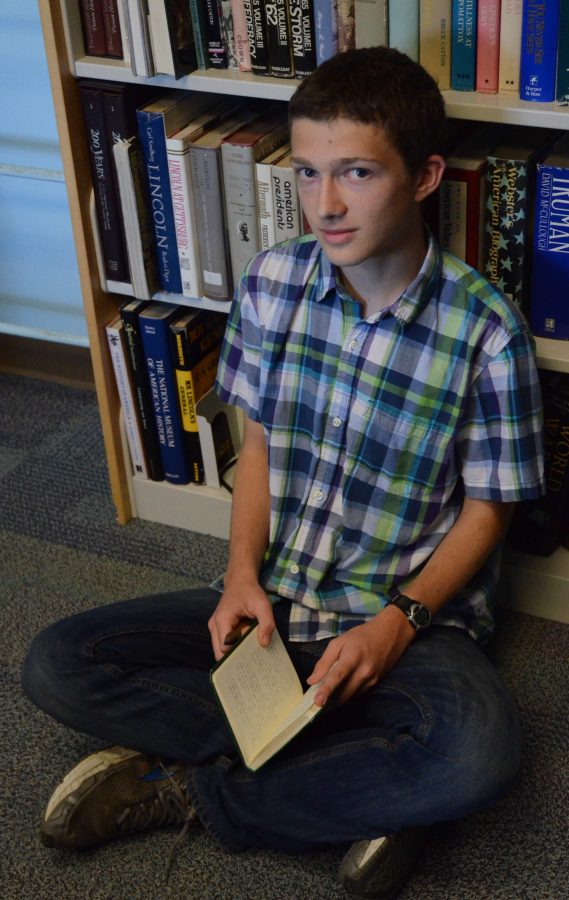Humans of Harker: Andrew Rule and the personas we make
“When I look at a character, whether it’s a character that I’m reading or a character who’s right in front of me, an actual person – because they’re really not that different, a fictional character and a real character – the reason that appeals to me is because I can see so much of myself in that character,” Andrew Rule said.
November 9, 2016
Andrew Rule, who writes short stories, is fascinated with the construction of characters.
Andrew pursues his interest in writing in his free time, serving as a co-editor-in-chief of Harker’s Eclectic Literary Magazine (HELM).
“Academically, [Andrew]’s very good at English,” Kai-Siang Ang (12), who has been Andrew’s friend since sixth grade, said. “Generalizing that – he’s very good at having his own thoughts instead of relying on the thoughts of others. Forming those opinions, and being able to express them honestly, [in a] clear and understandable fashion, and then getting other people to be able to see his viewpoint.”
Andrew’s independence of thought may be a product of his unique personality. A self-described introvert, Andrew believes that being an introvert enables the formation of individual thoughts.
“[Being an introvert] is something I’m proud of. It’s something I’ve had to try to quell a little bit because it doesn’t always serve me well, but I think it promotes introspection,” Andrew said. “I think that it does shape the way I look at the world because most of my goal in life is to understand myself – to understand the world, but through understanding the world, understand myself, and that’s because I’m an introvert. It’s because I am aware that I see the world through my own lens, rather than somebody else’s.”
But Andrew acknowledges that his is but one of many interpretations of the world, and strives to create deep, realistic characters in his writings. Andrew believes that well-developed characters are most important of the many components involved in creating a story.
“I think if I’m writing a story, the most important thing to me is that it have a character that’s complex, a character who is open to interpretation,” Andrew said. “I think literature is a conversation between the person who’s reading it and the person who’s writing it, and I don’t want to push my side of the conversation. I want the story that I’m writing still to be open to the person who’s reading it to give their side of the story.”
Though Andrew’s introversion and fascination with characters may initially appear to be contradictory, they stem from the same fundamental motivations. Through understanding the motivations that drive a character, Andrew is able to better understand himself.
“When I look at a character, whether it’s a character that I’m reading or a character who’s right in front of me, an actual person – because they’re really not that different, a fictional character and a real character – the reason that appeals to me is because I can see so much of myself in that character,” Andrew said. “There’s always something that links me to the person in front of me, and that’s why I’m so interested in self-understanding, and understanding other people – it’s because they’re really two ways to say the same thing. If I understand you, or I understand myself, they’re two sides of the same coin.”
This desire to understand the human condition also motivates Andrew’s stylistic preference for discovery writing, or writing a story before its entire scope is known.
“My starting point is never ‘[have] a plot point, and from the plot point make a whole plot and then fit characters to the plot’ – that doesn’t work for me,” Andrew said. “I take a character, I take multiple characters, I put them together, and see how the story grows from there. I have to understand the character before I can understand the story, not the other way around.”
Ultimately, Andrew writes to explore the concept of character. “Character” wears two masks – the personae of a play, and the personae that we play. And through these well-crafted characters, Andrew hopes to help himself and others achieve greater self-understanding.
“Every writer writes what they read. I’m just a composite of all the writers I’ve read before,” Andrew said. “What I like to read is character-driven fiction, character-driven poetry and character-driven nonfiction, because that’s where the truth is. It’s not about delivering a message, it’s more about delivering one life – because all the truth you can need is in every person.”


















![“[Building nerf blasters] became this outlet of creativity for me that hasn't been matched by anything else. The process [of] making a build complete to your desire is such a painstakingly difficult process, but I've had to learn from [the skills needed from] soldering to proper painting. There's so many different options for everything, if you think about it, it exists. The best part is [that] if it doesn't exist, you can build it yourself," Ishaan Parate said.](https://harkeraquila.com/wp-content/uploads/2022/08/DSC_8149-900x604.jpg)




![“When I came into high school, I was ready to be a follower. But DECA was a game changer for me. It helped me overcome my fear of public speaking, and it's played such a major role in who I've become today. To be able to successfully lead a chapter of 150 students, an officer team and be one of the upperclassmen I once really admired is something I'm [really] proud of,” Anvitha Tummala ('21) said.](https://harkeraquila.com/wp-content/uploads/2021/07/Screen-Shot-2021-07-25-at-9.50.05-AM-900x594.png)







![“I think getting up in the morning and having a sense of purpose [is exciting]. I think without a certain amount of drive, life is kind of obsolete and mundane, and I think having that every single day is what makes each day unique and kind of makes life exciting,” Neymika Jain (12) said.](https://harkeraquila.com/wp-content/uploads/2017/06/Screen-Shot-2017-06-03-at-4.54.16-PM.png)








![“My slogan is ‘slow feet, don’t eat, and I’m hungry.’ You need to run fast to get where you are–you aren't going to get those championships if you aren't fast,” Angel Cervantes (12) said. “I want to do well in school on my tests and in track and win championships for my team. I live by that, [and] I can do that anywhere: in the classroom or on the field.”](https://harkeraquila.com/wp-content/uploads/2018/06/DSC5146-900x601.jpg)
![“[Volleyball has] taught me how to fall correctly, and another thing it taught is that you don’t have to be the best at something to be good at it. If you just hit the ball in a smart way, then it still scores points and you’re good at it. You could be a background player and still make a much bigger impact on the team than you would think,” Anya Gert (’20) said.](https://harkeraquila.com/wp-content/uploads/2020/06/AnnaGert_JinTuan_HoHPhotoEdited-600x900.jpeg)

![“I'm not nearly there yet, but [my confidence has] definitely been getting better since I was pretty shy and timid coming into Harker my freshman year. I know that there's a lot of people that are really confident in what they do, and I really admire them. Everyone's so driven and that has really pushed me to kind of try to find my own place in high school and be more confident,” Alyssa Huang (’20) said.](https://harkeraquila.com/wp-content/uploads/2020/06/AlyssaHuang_EmilyChen_HoHPhoto-900x749.jpeg)










